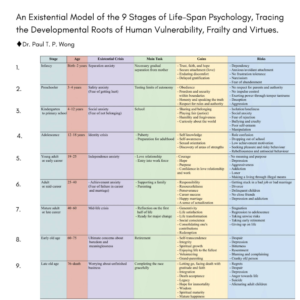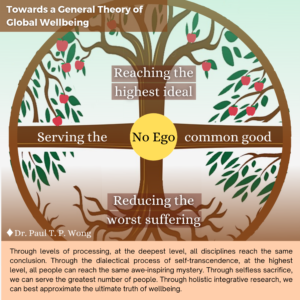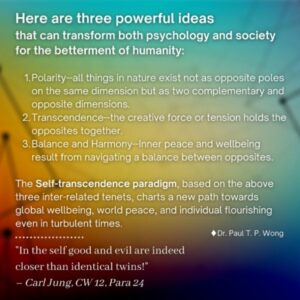Piers Worth’s textbook on positive psychology represents a landmark publication, because it heals the unfortunate divide between humanistic and positive psychology and demonstrates that an integration between these two schools can be done to advance the science of global wellbeing (Churchill, 2021; Kaufman, 2020; Wong, 2021a).
This book can be considered a worthy sequel to the ground-breaking textbook exploring a variety of topics considered relevant to Second Wave Positive Psychology (Ivtzan et al., 2015), which explores several aspects of the dark side of life and examines their role in our positive transformation. Worth, one of the co-authors of that textbook, has gone much further by integrating these topics within a coherent story of humanity’s heroic struggles to survive and thrive in an often-hostile environment, as in the era of COVID-19.
An Existential Model of Human Development
There are several unique aspects of this textbook that are worthy of attention. First of all, it focuses on the process of change at different levels – from the unfolding of one’s life, to the dialectical process of achieving a goal in any lived context. Thus, the journey of life is conceptualized as different stages of development. Personal growth in each stage involves some struggle to resolve an existential crisis.
Here is my existential model (Figure 1) which is an extension of Erickson’s model and summarizes the main thrust of this book. This model complements Erickson’s stage model – life is a constant struggle at every stage of human development. Through overcoming the difficulties in our lives, can we achieve a healthy and happy psychological life.
Figure 1
An Existential Model of the 9 Stages of Life-Span Psychology

The Positive Psychology of Suffering
The second important aspect is its treatment of suffering as an inherent aspect of life. In a recent book review (Wong, 2020a), I mentioned that Compton and Hoffman’s positive psychology textbook is the first one devoted a whole section to the psychology of suffering in PP 2.0. I can hardly believe that the topic of suffering is weaved into every chapter of Worth’s textbook.
The problem of suffering was posed to Seligman shortly after launching PP in 1998. His answer in his 2003 Newsletter was: “More commonly we overcome troubles by doing end-runs around them, by deploying our highest strengths as buffers against the setbacks of life.”
However, it is very difficult if not impossible to maneuver around suffering, especially existential suffering, because it is an inherent part of life (Fowers et al., 2017).
No one is immune from it. It is inevitable that we will experience setbacks, obstacles, failures, losses, sickness, and death. PP 2.0 is about how to respond to adversity in a positive and adaptive manner. From the perspective of lived experience, real resilience and life satisfaction come from eventual triumphs in the heroic struggles between life and death, good and evil, and success and defeat. Unlike cold statistics, such lived experiences fill the pages of Worth’s book, giving readers an uplifting and realistic understanding of how to flourish in adversity.
The Paradox of Self-transcendence (ST)
Simply put, ST is the pathway of personal development and spiritual practice that can empower us to flourish through transcending our suffering and human limitations (Frey & Vogler, 2019; Worth & Smith, 2021). This approach can be described as going higher to fulfill one’s aspirations by going deeper to sink one’s roots in suffering; the result is to become what we were meant to be – making a unique contribution to humanity, as illustrated in Figure 2.
Figure 2
Towards a General Theory of Global Wellbeing

ST is the least understood, but most important breakthrough in psychology during the 21st century. The mental block could be due to the egotistic mindset in an individualist and secular culture; a happiness-driven consumer culture wants us to avoid the subject of suffering in order to maintain our happy feelings and thoughts about life.
A less visible but important barrier in mainstream psychology is self psychology (such as self-efficacy) from the last century, which dismisses self-transcendence because it advocates selflessness (Yaden et al., 2017). Paradoxically, PP 2.0 emphasizes that we need to confront and embrace suffering and death in order to find sustainable happiness and meaning in serving others. ST requires a mega shift to a more collectivistic and a more humanistic and existential mindset.
The new science of existential positive psychology was pioneered by Viktor Frankl and expanded by Paul Wong (2020b). Both began their search for meaning and wellbeing when they were at the bottom of a dark pit. They found their way out of the abyss through self-transcendence (ST).
Maslow’s (1971) concept of transcendence and Scott Barry Kaufman’s (2020) expansion provides yet another pathway of how to lose oneself to serve something greater and awe-inspiring. The recent Frontiers special issue on existential positive psychology (Wong et al., in press) reveals the rapid development of this new science.
The Need for an Existential Self
“Who am I really?” This question is typically trigger by some existential crisis (Wong, 2020c). Whenever people ask this question, they are seeking some existential understanding of selfhood beyond their self-image or objective characteristics, such as gender, occupation, or marital status. This question demands some self-reflection on what really matters to them.
Worth’s books shows that the discovery of an existential self is needed not only for living at a deeper level, but also for transcending the horrors of life. Van Stee (2017) shows that Cognitive Neuroscience research is also looking into the existential selfhood, which used to belong to the domain of existential philosophers, like Søren Kierkegaard and Irvin D. Yalom.
Research on wellbeing overwhelming focuses on subjective wellbeing and happiness (Diener et al., 2018). This is understandable: Who does not want to be positive? Who does not want to have more love, laughter, and simple pleasures? But PP 2.0 proposes that the direct pursuit of happiness-enhancing activities as the final life goal may be counter-productive. It may lead to toxic positivity (Villines, 2021, Wibowo, 2020); furthermore, unexpected things happen, and fate intrudes. Numerous unexpected undesirable events, such as life-threatening sickness, accidents, death of a loved one, or the pandemic, can derail even the best evidence-based plans for happiness and success. That is why self-transcendence is the way to go beyond such egotistic concerns and to find enduring fulfillment (Wong 2021b). True positivity is to discover the moon and stars in the darkest night.
There is also the all too familiar human phenomenon that successfully achieving one’s cherished goal seldom leads to the kind of happiness as initially imagined or expected. Human beings are not very good in predicting their own happiness (Gilbert, 2006). Happiness typically returns to the original set-point for a variety of reasons, such as the process of habituation and inescapable human suffering discussed earlier.
Humanistic-existential psychology founders, Carl Roger, Abraham Maslow, and Rollo May, were concerned not only about how to become self-actualized and how to live well, but also concerned about the necessity of courage, anxiety, and responsibility to live authentically, even when life is full of uncertainties, suffering, and mysteries. They inspire people to live fully, choosing one’s own destiny and by accepting and experiencing the vicissitudes of life, no matter how difficult. Therefore, they offer a more realistic and helpful psychological and philosophical guide to living a good life, but they suffer from lacking a comprehensive empirical agenda based on quantitative research.
Worth shows that PP 2.0 can both deepen positive psychology with existential insights and strengthen the empirical base of humanistic-existential psychology. The most hopeful note is that we always have the freedom and possibility of creating a better future for ourselves and for society, regardless of our circumstances.
Conclusion
The pandemic has shifted the focus on what is positive to a more realistic view of seeing the brightest stars in the darkest night – true positivity according to existential positive psychology. This is shift is like changing the course of the Titanic towards a more balanced view of the good life.
The dominant narrative of positive psychology is to fill our lives with positive experiences and emotions in order to live the good life. An alternative vision is that life is a balancing act (Wong, 2011). The most fulfilling life is one of harmony when we learn to embrace and transcend its duality of the good and bad times, as represented by the ancient symbol of Yin-Yang (Carreno et al., 2021; Robbins, 2021). A truly positive person knows how to stay positive in negative and ambivalent situations. PP 2.0 encourages research on how such sustainable positivity is achieved through dialectical interactions between Yin and Yang.
The take home message of this textbook is that it is only through struggle and fortitude can we discover our true existential self and grow as a person. More importantly, it is only through embracing life in its totality and wrestling with life’s ultimate concerns that we can uplift the human spirit and improve the human condition, even in the darkest moments. Figure 3 summarizes the main tenants of PP 2.0. PP 2.0 says that happiness and suffering are inseparable; to become one’s true self is to kindle one’s light in darkness.
Figure 3
A Summary of the Main Tenants of PP 2.0

References
- Carreno, D. F., Eisenbeck, N., Pérez-Escobar, J. A., & Garcia-Montes, J. M. (2021). Inner harmony as an essential facet of well-being: A multinational study during the COVID-19 pandemic. Frontiers. https://doi.org/10.3389/fpsyg.2021.648280
- Churchill, S. (2021, August). On the possibility of an existential positive psychology. Keynote address presented at the 11th Biennial International Meaning Conference, Toronto, Canada.
- Diener, E., Lucas, R. E., & Oishi, S. (2018). Advances and Open Questions in the Science of Subjective Well-Being. Collabra. Psychology, 4(1), 15. https://doi.org/10.1525/collabra.115
- Fowers, B. J., Richardson, F. C., & Slife, B. D. (2017). Frailty, suffering, and vice: Flourishing in the face of human limitations. American Psychological Association.
- Frey, J. A., & Vogler, C. (2019). Self-transcendence and virtue: Perspectives from philosophy, psychology, and theology. Routledge.
- Gilbert, D. (2006). Stumbling on happiness. Knopf.
- Ivtzan, I., Lomas, T., Hefferon, K., & Worth, P. (2015). Second wave positive psychology: Embracing the dark side of life. Routledge.
- Kaufman, S. B. (2020). Transcend: The New Science of Self-Actualization. Tarcher Perigee.
- Maslow, A. H. (1971). The Farther Reaches of Human Nature. Viking Press.
- Robbins, B. D. (2021). The joyful life: An existential-humanistic approach to positive psychology in the time of a pandemic. Frontiers. https://doi.org/10.3389/fpsyg.2021.648600
- Seligman, M. E. P. (2003). Authentic Happiness. University of Pennsylvania. https://www.authentichappiness.sas.upenn.edu/newsletters/authentichappiness/suffering
- van Stee, A. (2017). Understanding existential self-understanding. Universiteit Leiden. https://www.universiteitleiden.nl/en/research/research-output/humanities/understanding-existential-self-understanding?fbclid=IwAR2k0xL1-jn1UB8RjJRbT7fvHUKZOb-gwxU9f2qXmvPNwdKmUiddl6gTgoc
- Villines, Z. (2021, March 30). What to know about toxic positivity. Medical News Today. https://www.medicalnewstoday.com/articles/toxic-positivity Wibowo, Rahmadina. (2020).
- Wibowo, R. S. (2020). The answers are not always optimism: Overcoming toxic positivity during [ESSAY]. https://www.researchgate.net/publication/349824345_The_Answers_Are_Not_Always_Optimism_Overcoming_Toxic_Positivity_During_ESSAY
- Wong, P. T. P. (2011). Positive psychology 2.0: Towards a balanced interactive model of the good life. Canadian Psychology/Psychologie canadienne, 52(2), 69–81. https://doi.org/10.1037/a0022511
- Wong, P. T. P. (2020a). The maturing of positive psychology and the emerging PP 2.0 [Book review of Positive Psychology (3rd ed.) by William Compton and Edward Hoffman]. International Journal on WellBeing, 10(1). https://doi.org/10.5502/ijw.v10i1.885
- Wong, P. T. P. (2020b). Made for Resilience and Happiness: Effective Coping with COVID-19 According to Viktor E. Frankl and Paul T. P. Wong. INPM Press.
- Wong, P. T. P. (2020c). Meaning and evil and a two-factor model of search for meaning [Review of the essay Meaning and Evolution, by R. Baumeister & W. von Hippel]. Evolutionary Studies in Imaginative Culture, 4(1), 63-67. DOI: 10.26613/esic/4.1.170
- Wong, P. T. P. (2021a). Existential Positive Psychology (PP 2.0) and global wellbeing: Why it is Necessary During the Age of COVID-19. International Journal of Existential Positive Psychology, 10(1), 1-16.
- Wong, P. T. P. (2021b, August). Beyond Happiness and Success: The New Science of Self-transcendence. Keynote address presented at the 11th Biennial International Meaning Conference, Toronto, Canada.
- Wong, P. T. P., Mayer, C.-H., & Arslan, G. (Eds.). (In press). Special Issue: COVID-19 and Existential Positive Psychology (PP 2.0): The new science of self-transcendence [Special Issue]. Frontiers.
- Worth, P., & Smith, M. D. (2021). Clearing the pathways to self-transcendence. Frontiers. https://doi.org/10.3389/fpsyg.2021.648381
- Yaden, D. B., Haidt, J., Hood, R. W., Vago, D. R., & Newberg, A. B. (2017). The Varieties of Self-Transcendent Experience. Review of General Psychology, 21(2), 143–160. https://doi.org/10.1037/gpr0000102
Cite
Wong, P. T. P. (in press). Forword. In P. Worth (Ed.), Positive Psychology Across The Life Span An Existential Perspective. Routledge.

